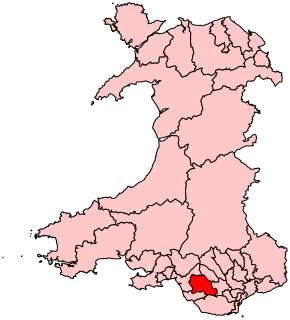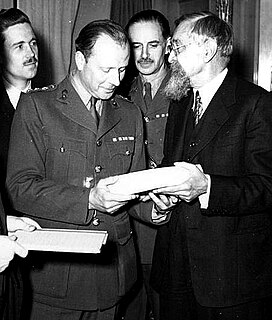The Acton by-election, 1943 was a by-election held on 12 December 1943 for the British House of Commons constituency of Acton in London.
By-elections, also spelled bye-elections, are used to fill elected offices that have become vacant between general elections.

In the United Kingdom (UK), each of the electoral areas or divisions called constituencies elect one member to a parliament or assembly, with the exception of European Parliament and Northern Ireland Assembly constituencies which are multi member constituencies.

Acton was a constituency of the House of Commons of the Parliament of the United Kingdom, created for the 1918 general election. It elected one Member of Parliament (MP) by the first-past-the-post system of election.
The seat had become vacant after the death in October of the Conservative Member of Parliament (MP) Hubert Duggan. He had first been elected at the 1931 general election.

Death is the permanent cessation of all biological functions that sustain a living organism. Phenomena which commonly bring about death include aging, predation, malnutrition, disease, suicide, homicide, starvation, dehydration, and accidents or major trauma resulting in terminal injury. In most cases, bodies of living organisms begin to decompose shortly after death.

The Conservative Party, officially the Conservative and Unionist Party, is a centre-right political party in the United Kingdom. Presently led by Theresa May, it has been the governing party since 2010. It presently has 314 Members of Parliament in the House of Commons, 249 members of the House of Lords, and 18 members of the European Parliament. It also has 31 Members of the Scottish Parliament, 12 members of the Welsh Assembly, eight members of the London Assembly and 9,008 local councillors. One of the major parties of UK politics, it has formed the government on 45 occasions, more than any other party.
Hubert John Duggan was a British Army officer and politician, who was Conservative Party Member of Parliament for Acton from 1931 until his death. He was an opponent of appeasement and broke the whip on several important occasions, voting to bring down Neville Chamberlain in 1940.
During World War II, the major parties had agreed an electoral pact under which they would not contest by-elections in seats held by their respective parties, and as a result many wartime by-elections resulting in a candidate being returned unopposed. However, other parties and independent politicians were free to field candidates.

World War II, also known as the Second World War, was a global war that lasted from 1939 to 1945. The vast majority of the world's countries—including all the great powers—eventually formed two opposing military alliances: the Allies and the Axis. A state of total war emerged, directly involving more than 100 million people from over 30 countries. The major participants threw their entire economic, industrial, and scientific capabilities behind the war effort, blurring the distinction between civilian and military resources. World War II was the deadliest conflict in human history, marked by 50 to 85 million fatalities, most of whom were civilians in the Soviet Union and China. It included massacres, the genocide of the Holocaust, strategic bombing, premeditated death from starvation and disease, and the only use of nuclear weapons in war.
Initially there were six candidates but the independent labour and liberal candidates withdrew leaving Walter Padley for the Independent Labour Party (ILP), Edward Godfrey who sought election as an 'English Nationalist' candidate, Independent Dorothy Crisp who wrote for the Sunday Dispatch and the official Conservative candidate Henry Longhurst.
Walter Ernest Padley was a British Labour politician.

The Independent Labour Party (ILP) was a British political party of the left, established in 1893, when the Liberals appeared reluctant to endorse working-class candidates, representing the interests of the majority. A sitting independent MP and prominent union organiser, Keir Hardie, became its first chairman.
Dorothy Crisp (1906–1987) was a right-wing English political figure, writer and publisher.
During the war Walter Padley had been a conscientious objector. In 1950 he was elected Labour Party MP for Ogmore and served until 1979.
A conscientious objector is an "individual who has claimed the right to refuse to perform military service" on the grounds of freedom of thought, conscience, or religion.
The Labour Party is a centre-left political party in the United Kingdom which has been described as an alliance of social democrats, democratic socialists and trade unionists. The party's platform emphasises greater state intervention, social justice and strengthening workers' rights.

Ogmore is a constituency created in 1918 represented in the House of Commons of the UK Parliament by Chris Elmore of the Labour Party.
Godfrey was founder of the English National Association, an organisation with alleged Fascist leanings.
The English National Association (ENA) was a political group active in the United Kingdom during the Second World War. It was accused of having fascist sympathies.
The by-election was held on an electoral roll which had not been updated since 1937.




